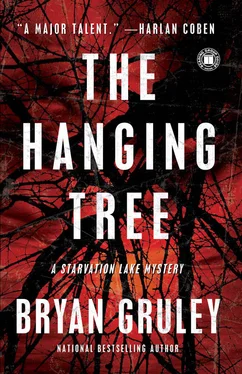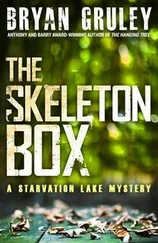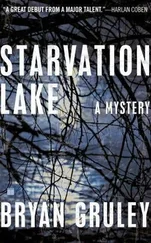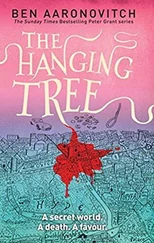Bryan Gruley - The Hanging Tree
Здесь есть возможность читать онлайн «Bryan Gruley - The Hanging Tree» весь текст электронной книги совершенно бесплатно (целиком полную версию без сокращений). В некоторых случаях можно слушать аудио, скачать через торрент в формате fb2 и присутствует краткое содержание. Жанр: Триллер, на английском языке. Описание произведения, (предисловие) а так же отзывы посетителей доступны на портале библиотеки ЛибКат.
- Название:The Hanging Tree
- Автор:
- Жанр:
- Год:неизвестен
- ISBN:нет данных
- Рейтинг книги:3 / 5. Голосов: 1
-
Избранное:Добавить в избранное
- Отзывы:
-
Ваша оценка:
- 60
- 1
- 2
- 3
- 4
- 5
The Hanging Tree: краткое содержание, описание и аннотация
Предлагаем к чтению аннотацию, описание, краткое содержание или предисловие (зависит от того, что написал сам автор книги «The Hanging Tree»). Если вы не нашли необходимую информацию о книге — напишите в комментариях, мы постараемся отыскать её.
The Hanging Tree — читать онлайн бесплатно полную книгу (весь текст) целиком
Ниже представлен текст книги, разбитый по страницам. Система сохранения места последней прочитанной страницы, позволяет с удобством читать онлайн бесплатно книгу «The Hanging Tree», без необходимости каждый раз заново искать на чём Вы остановились. Поставьте закладку, и сможете в любой момент перейти на страницу, на которой закончили чтение.
Интервал:
Закладка:
“Uh,” he said, “I don’t think you’re supposed to be back here. I mean, you’re not.” He tossed his head toward the police tape. “You know, the cops.”
“Yep, saw it,” I said. “Sorry. I didn’t touch anything. Just wanted to look around, see if there were any, like, pictures or anything I could use for the paper. I would’ve asked the sheriff for permission, of course. She was my second cousin, you know. Gracie, that is.”
Johnny looked around the room. “You find any?”
“No, not really. Nothing I can use. Guess I’ll check with her mother.”
He just stood there, saying nothing.
“You going to run the Zamboni now?”
It was a dumb question I hoped would distract him. “Already did.”
“Did Gracie ever let you?”
“Once.” He turned back to me. “You better go.”
“OK.” I put my hands in my pockets, made sure I still had the brush and the shoe. Not that I had any idea what use they would be.
“Sad thing, isn’t it?”
Johnny shrugged. I wondered, for just a second, if Gracie might have seduced him, just for kicks. Probably not, I decided.
“You didn’t see a cell phone around, did you?” he said.
“A cell phone? You have a cell phone?”
“Used to. She borrowed it.”
“She borrowed your cell phone?”
“For twenty dollars.”
“Oh. Well, no. Didn’t see it. Sorry.”
He looked around the room again. “I got to get back.”
I took a step closer to him. “Hey, Johnny, do me a favor, will you?” His face told me he wasn’t sure. “You know the expression ‘What goes on the road stays on the road’?”
“Nope.”
“Ha. Well, it’s a hockey thing. I was hoping maybe you’d kind of think of me coming here like that. One skater to another. I don’t want to get the cops pissed off. Especially when one of them’s my girlfriend, you know?”
“I’m not a skater anymore.”
“Just between us then?”
“Twenty bucks?” he said.
I gave him a ten and two fives. I was less worried about the sheriff finding out I was snooping beyond his police tape than I was about everyone else in town hearing it.
On the way back to town I dialed Darlene’s cell. It went immediately to voice mail. “Remind me,” I said. “Which shoe was Gracie missing?”
seven
My password opened Philo’s computer.
The techies hadn’t gotten around to disabling the override the Pilot ’s previous owners had bestowed upon me as the boss of exactly three people. I supposed that they would get around to it, and then Philo probably would have the ability to pry into my e-mails. But for the moment, Media North’s organizational inertia was working in my favor. While my truck idled in the parking lot behind the newsroom, I scrolled through Philo’s e-mails. I wanted to confirm a hunch.
The subject line on a 9:14 a.m. e-mail read, “RE: hskl meetng.” I opened the e-mail. Now is not the time to stand on principle, I thought, remembering what Philo had said to me on the phone. I read the e-mail. phi- haskell amp; 1 other 11:15 his place great opp here. No time 4 soap box. jmk
“Figures,” I said to myself.
I closed up the computer and headed back out to my truck.
Only through the naked trees of winter could you see Laird Haskell’s home from the road. And, on this gray morning, Haskell himself, coatless on his porch.
After more than twenty-five years suing auto companies for building unsafe cars and trucks that killed and maimed and burned people, Haskell was a bona fide millionaire. He had lived in Bloomfield Hills near Detroit among many of the executives who appeared as defendants on his lawsuits. He had bought his house on Starvation as a weekend getaway in the mid-1970s after seeing the lake when he’d come to watch his nephew’s Port Huron team play against the Rats.
Many years later, it turned out that his own son was quite a player. Minding the net for HoneyBaked Ham’s peewee team in Detroit, Taylor Haskell had let in, on average, fewer than two goals per game and registered an astonishing twenty-three shutouts in the fifty-six games he had played. But Laird Haskell was not satisfied, not with the coaching of his son, or with the players around his son, or with the fact that, every few games, HoneyBaked’s other goaltender would get a chance to play. He moved his boy to Little Caesars, then to Emmert Chevrolet. But nothing was good enough for Laird Haskell, who, like so many deluded hockey dads and moms, believed his son was destined for the NHL.
Haskell sold his Bloomfield Hills home and moved his son and wife to the palatial house on Starvation. They hadn’t been in town a month before Haskell appeared before the town council to say he had bought a thirty-acre parcel of land on which he planned to build the River Rats a new home, the Felicia Haskell IcePlex, with his own $7.5 million, all cash. He just needed a property tax break and a little help getting utilities hooked up.
I hadn’t seen him up close in years. Once in a while I’d glimpse him on the lake, shirtless at the wheel of his cruiser, or directing his help at his boathouse, which was about the size of Mom’s cottage. In Starvation he kept a low profile for a man who had made his name as one of the most effective plaintiff’s lawyers in the country, the scourge of Detroit’s automakers. He dispatched his attorney to most of the public meetings about the rink. Of course he showed up for every River Rats game to watch his son tend goal. But even there, he kept to himself; he had paid to have a small private box built in a high corner of the bleachers, where he served cocktails to men and women who came from places other than Starvation and vanished afterward, presumably to hotels or bed-and-breakfasts in the real resort towns, Charlevoix or Petoskey or Traverse City. Normally this would have been the source of much carping and gossip around the breakfast tables at Audrey’s, but no one dared to speak ill of Laird Haskell once he’d offered to build that rink with his own money.
He waved to me as I eased my truck down a steep winding path plowed to the bare concrete. Fake gas lamps glowed along both sides of the path. Haskell ambled off the porch and stood waiting at the end of the drive. The house loomed up before me, three stories of cream siding, picture windows framed in maple, cantilevered decks someone had bothered to shovel. Plumes of smoke wafted up from a brick chimney. Even the firewood stacked neatly against the house had been swept clean of the night’s snow.
As I parked, Haskell approached, smiling. I wished he wouldn’t. The veneer of familiarity made me uncomfortable, even if we had in fact known each other for a good many years. He was grayer and thinner on top than I remembered, a small man, no bigger than me, who moved with the sureness of someone who had calmly accused chief executives to their faces of murdering the people who had died in their cars and trucks. His paunch nudged a little more firmly at his starched denim shirt, but Haskell was well kept for a man in his sixties. His smile, in particular, looked just as sculpted and willful as I’d seen it when he was beguiling juries and making himself wealthy.
I hopped out of my truck, automatically patting my back pocket for my notebook. Haskell stepped up and took my right hand into both of his.
“Long time, Gus,” he said. “I guess it really is true: you can run but you can’t hide.”
“You talking about me or you?”
He laughed and put an arm around my shoulders. “Let me show you my shack,” he said, as if I’d never written a single story calling the money behind his project into question, as if he’d never had his lawyer order me to stop calling the Haskell home at the dinner hour, as if we were old friends who’d bumped into each other at the country club.
Читать дальшеИнтервал:
Закладка:
Похожие книги на «The Hanging Tree»
Представляем Вашему вниманию похожие книги на «The Hanging Tree» списком для выбора. Мы отобрали схожую по названию и смыслу литературу в надежде предоставить читателям больше вариантов отыскать новые, интересные, ещё непрочитанные произведения.
Обсуждение, отзывы о книге «The Hanging Tree» и просто собственные мнения читателей. Оставьте ваши комментарии, напишите, что Вы думаете о произведении, его смысле или главных героях. Укажите что конкретно понравилось, а что нет, и почему Вы так считаете.












